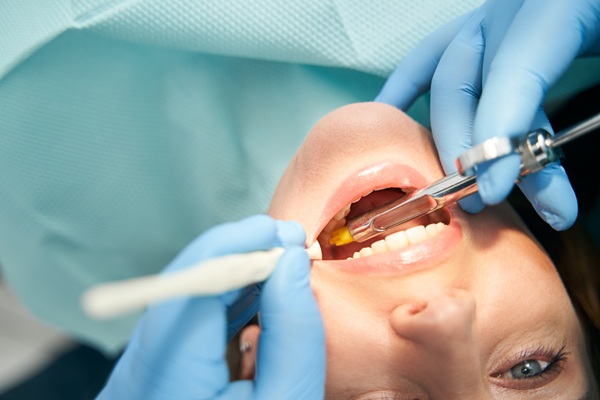The Basics of IV Sedation in Dentistry

While people can feel anxious about certain dental procedures, IV sedation offers a safe and effective way to help patients stay calm and comfortable while allowing a dental provider to complete necessary treatments. No matter how patients feel about dental treatment, avoiding dental care can negatively impact one's oral health. Learning about the benefits and safety of this sedation option can also ease concerns before an upcoming procedure.
What is IV sedation?
IV sedation is a form of conscious sedation that is administered through a vein. This method allows the sedative to take effect quickly, helping patients feel deeply relaxed while remaining responsive. Unlike general anesthesia, which causes complete unconsciousness, IV sedation allows patients to stay in a semi-conscious state where they can still respond to simple instructions.
Oral surgeons often use this type of sedation for procedures such as wisdom tooth extractions, dental implants, and other surgical treatments. Because the medication is delivered directly into the bloodstream, the level of sedation can be adjusted as needed to ensure maximum comfort.
Who can benefit from IV sedation?
Many patients can benefit from IV sedation, especially those who experience anxiety or fear surrounding dental procedures. This type of sedation is particularly helpful for:
- Patients with dental anxiety or phobia
- Individuals undergoing lengthy or complex oral surgeries
- Those with a strong gag reflex
- Patients who have difficulty getting numb with local anesthesia alone
- Individuals with medical conditions that make it difficult to remain still during a procedure
Before recommending IV sedation, the oral surgeon will review the patient’s medical history and current medications to ensure it is a safe option.
What to expect during the procedure
Before the procedure begins, the practitioner inserts a small needle into a vein, usually in the arm or hand. The sedative is then delivered directly into the bloodstream, allowing the effects to begin within minutes. Patients will feel deeply relaxed and may not remember much about the procedure.
Throughout the treatment, the oral surgeon and team closely monitor the patient’s vital signs, including heart rate, blood pressure, and oxygen levels. Since the level of sedation can be adjusted at any time, the oral surgeon ensures the patient remains comfortable.
After the procedure, patients may feel groggy for a few hours. Because IV sedation can affect coordination and memory, it is necessary to arrange for a trusted adult to drive the patient home and stay for assistance during recovery.
Recovery and aftercare
The effects of IV sedation wear off gradually, but patients should plan to rest for the remainder of the day. Drinking plenty of fluids and following the oral surgeon’s aftercare instructions can help with a smooth recovery. Common aftereffects may include drowsiness, mild dizziness, and temporary memory loss of the procedure. These effects usually fade within 24 hours.
Patients should avoid driving, operating heavy machinery, or making important decisions until the sedative has fully worn off. It is important to follow any post-operative care guidelines to promote healing and prevent complications.
A safe and comfortable sedation option
For patients who experience dental anxiety or require complex procedures, IV sedation can provide a safe and effective solution. This method helps create a calm experience while ensuring the oral surgeon can complete the treatment smoothly. With proper preparation and aftercare, patients can feel confident in choosing this sedation option for a stress-free procedure.
Request an appointment here: https://stratford.premieroralsurgeryct.com or call Premier Oral Surgery & Implantology Center at (203) 760-0190 for an appointment in our Stratford office.
Check out what others are saying about our services on Yelp: IV Sedation in Stratford, CT.
Related Posts
Impacted teeth are a common dental condition where a tooth fails to fully erupt into its proper position in the mouth. This can occur due to crowding, abnormal growth angles, or obstruction by other teeth. Oral surgery, performed by specially trained oral surgeons, plays a critical role in managing impacted teeth, especially when complications arise…
An apicoectomy helps save a tooth when root canal treatment alone cannot resolve infection, and many patients wonder how long it takes to heal after an apicoectomy. Clear expectations about recovery reduce anxiety and support better outcomes. An endodontist reviews the procedure, provides aftercare instructions, and tailors the plan to each patient so the tooth,…
A single tooth implant can replace a natural tooth with a titanium rod and an artificial crown. It is custom-fit to fill the dental space after losing a tooth. Knowing more about this dental replacement can help you prepare for your next visit. Here are the details on how a single tooth implant can enhance…
A sinus lift procedure goes by many other names, including sinus elevation, sinus augmentation, and sinus graft. It can be an important step in the process of having a dental implant placed in the upper jaw to replace a missing tooth. The procedure involves raising the floor of one of the maxillary sinuses and filling…
